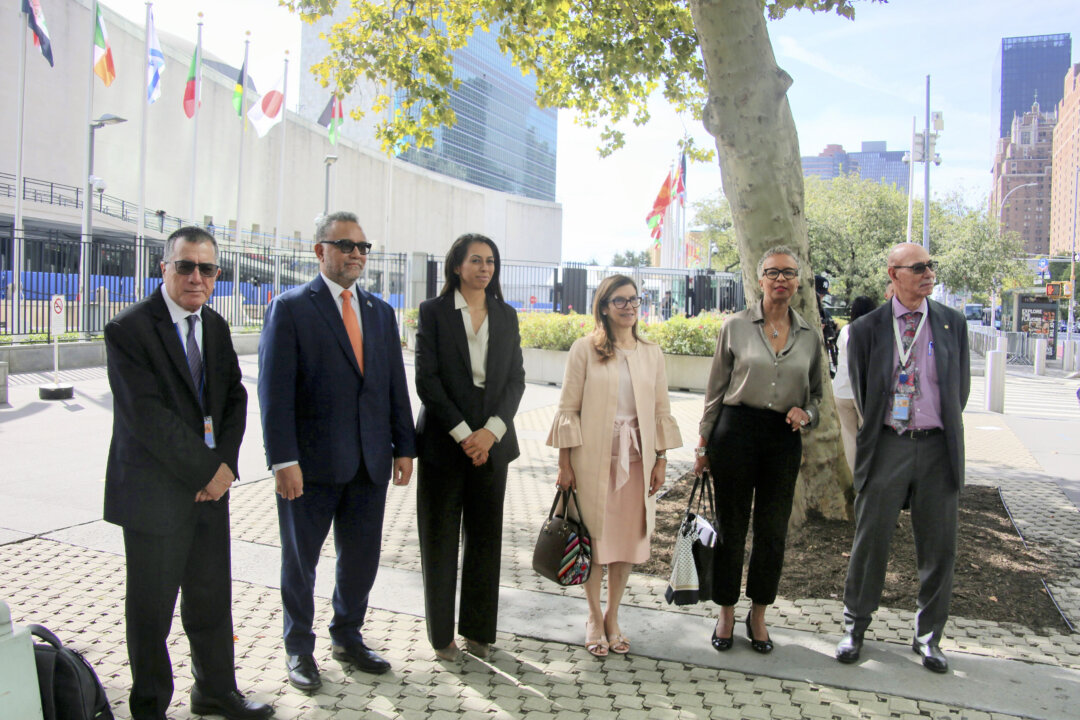Taiwan has been excluded from United Nations agencies, such as the World Health Organization, because of Beijing’s opposition.
NEW YORK CITY—Nine of Taiwan’s diplomatic allies have sent a joint letter to U.N. Secretary-General António Guterres calling for the island’s participation in the U.N. systems.
“It’s the day that I call our pilgrimage, in the name of Taiwan, to the United Nations, to continue to advocate for Taiwan’s meaningful participation in the United Nations,” Inga Rhonda King, permanent representative of St. Vincent and the Grenadines to the United Nations, told The Epoch Times outside of the U.N. headquarters in New York City on Sept. 19, after delivering the letter to the secretary-general’s office along with other U.N. representatives of Taiwan’s allies.
St. Vincent and the Grenadines was one of the countries that signed the letter. The other signees were Belize, Eswatini, Guatemala, the Marshall Islands, Palau, Saint Kitts and Nevis, Saint Lucia, and Tuvalu.
King said Taiwan’s more than 23 million citizens should not be excluded from the U.N. system. Additionally, since one of the U.N. initiatives has been trying to bridge the digital divide among nations, she added that Taiwan shouldn’t be left out since it is a leader in artificial intelligence and semiconductors.
Taiwan, officially called the Republic of China, left the U.N. as a permanent member of the Security Council in October 1971 after the U.N. General Assembly (UNGA) voted to pass Resolution 2758. China, officially known as the People’s Republic of China, subsequently took Taiwan’s U.N. seat.
Since then, Taiwan has been excluded from U.N. agencies, such as the World Health Organization (WHO) and the International Civil Aviation Organization, because of China’s opposition.
“There shouldn’t be any discrimination [against] Taiwan on the basis that [it is] not a member of the United Nations,” John Silk, permanent representative of the Marshall Islands to the United Nations, told The Epoch Times.
“[Taiwan] could participate in all these activities without causing too much problem as to the issues of nationhood.”
Letter
The letter urged the United Nations to “take proactive actions” to address “the malicious distortion” of Resolution 2758, arguing that the misinterpretation of the 1971 document “has posed a serious threat to the status quo across the Taiwan Strait and the peace and stability of the Indo-Pacific region,” according to a statement.
For years, the Taiwanese government has been trying to push back against the Chinese communist regime’s narrative that the resolution has adopted Beijing’s “one China” principle. The regime asserted that it could represent Taiwan in the U.N. system and have territorial sovereignty over the island because of the resolution.
The United Nations has repeated the Chinese regime’s assertion. For instance, on May 23, Stephane Dujarric, spokesperson for the U.N. secretary-general, said during a daily news briefing that the resolution was relevant in terms of the U.N.’s standing on Taiwan as a province of China.
“The United Nations should uphold the principle of neutrality and stop erroneously citing UNGA Resolution 2758 and improperly depriving Taiwanese people and the media of the rights to enter the United Nations to visit, attend, or cover meetings and events,” the joint letter reads.
The letter also urged the United Nations to “seek appropriate solutions” to allow Taiwan to participate in activities related to implementing the U.N. Sustainable Development Goals.
Taiwan’s diplomatic allies wrote to Guterres last year about the same issues.
Silk said he expected Guterres to respond to the letter this year.
“We expect that he will respond to us in due course,“ Silk said. ”I don’t think he’s going to ignore our letter. He’s going to have to respond to it. These are countries that are within the U.N. family.”
The 79th session of the UNGA is meeting for a general debate beginning on Sept. 24.
Taiwan
Lee Chih-chiang, director general of the Taipei Economic and Cultural Affairs Office in New York, has thanked the island’s allies for their effort.
“Taiwan sincerely hopes that the United Nations will uphold the ‘principle of universality’ and the commitment to ‘leave no one behind’ by including Taiwan’s meaningful participation to enhance the well-being of present and future generations, and to advocate for global democracy, peace, and prosperity,” Lee said in a statement.
U.S. Deputy Secretary of State Kurt Campbell said during a House hearing on Sept. 18 that China is using Resolution 2758 as a diplomatic tool to delegitimize Taiwan’s status.
He also noted the United States’ commitment to Taiwan in accordance with the Taiwan Relations Act, which authorizes the United States to provide the island with military equipment for self-defense.
In May, Sen. Jim Risch (R-Idaho), ranking member of the Foreign Relations Committee, and Sen. Jeanne Shaheen (D-N.H.) introduced a new resolution on the same issues.
The United States has had no formal diplomatic ties with Taiwan since Washington changed its diplomatic recognition in favor of Beijing in 1979. However, Washington and Taipei have enjoyed a robust relationship based on the Taiwan Relations Act.
The United States has a “one China” policy, which asserts that there is only one sovereign state with the name “China.” This policy is different from Beijing’s “one China” principle.
In recent weeks, the Australian Senate and the Dutch House of Representatives have each passed a motion supporting Taiwan’s participation in the U.N. system while rebuking China’s interpretation of Resolution 2758.
Edwin Huang contributed to this report.

